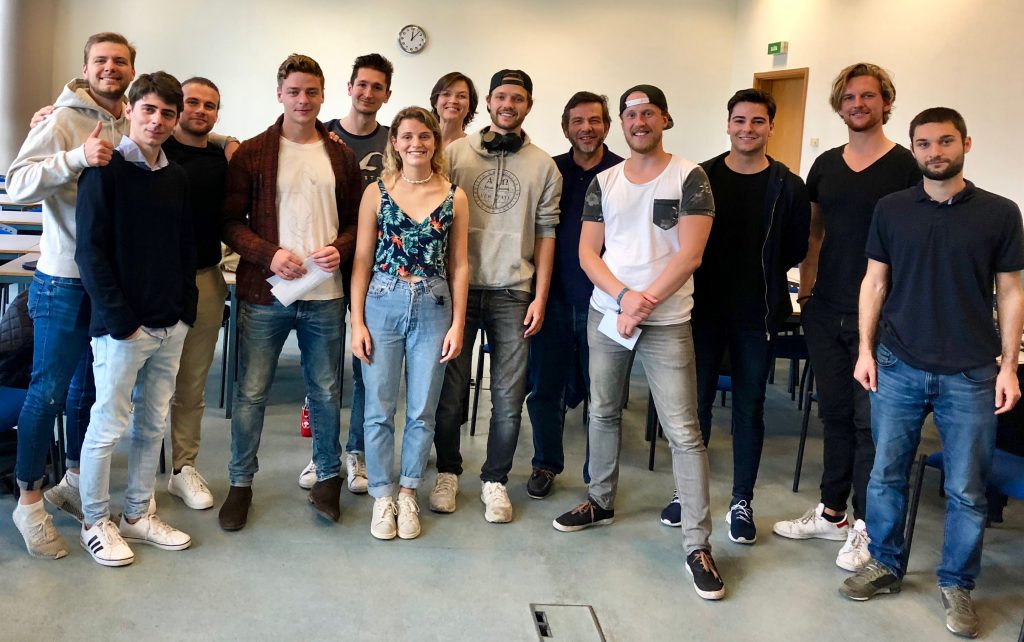How do you set boundaries correctly? Objectively and professionally. About the finding that the word ‘no’ is a complete sentence. Why good self-management helps against overload and why it is so important to make unmistakable announcements. And doing so with joy. Continue reading Self-management: It may be fun to say ‘no’.
Blog
We work to live and we live to work… stop it.
Holy shit,
calls someone running to work. In passing he sees me, an acquaintance. He throws his hand up, greeting at the double: “Sorry, no time”. He still had to buy presents, and they should really ‘do something here’. After all, they are the reward for all the work throughout the year. The whole “nerve.”
“you know: everything must be super,” he says, “it must be!”
In the time just before Christmas, everything seems to revolve around deadlines: closing hours, baking times, christmas cards…
Will we still make it for a coffee this year?”
What a question! Personally, there seem to be more people under stress than usual. In the subway, on the street, at work. Many call in sick. Does everyone really have the flu? Or does Christmas have something to do with it? Or another year that is already coming to an end?
ASK yourself: WHAT WAS GOOD IN your 2019?
… in the job, privately, in life. Very few people really have time for that. Or they don’t take it. There is always a lot to do. Too much stress. Everywhere.
Those who manage to pause, to stop, to reflect again on the year, sometimes come to the point of wondering whether it has already been done. And whether it should simply go on like this. Or:
Is there perhaps something else that lies dormant in me…
Why am I doing what I’m doing? Does my work make sense?” Such questions can be frightening. They question your chosen life. And sometimes an infinite number of To Do‘s are a welcome reason not to worry about that very question. Does that resonate with you?
I CAN REASSURE: YOU ARE NOT ALONE.
This is not – as is widely the case – the ‘problem’ of a generation. From my experience I can say that people of all ages question their professional activities more and more often and especially earlier. With the growing #digitalization, the human being is no longer just an executive force standing on an assembly line. We remember what it was like to deal with things that really mattered to us and fulfilled us and brought us to the ‘flow’.
That alone sounds great at first, but at the same time it presents us with a big challenge.
Because the question that arises is: “What do I really, really want to do? (Frithjof Bergmann). Bergmann already asked himself this question in the 70s and developed the idea of #NewWork from it.
DO THEY KNOW WHAT THEY WANT?
More and more often I meet clients in coaching who are looking for the above mentioned meaningfulness. It is a very personal and individual question and probably the most difficult to answer. It is the beginning of a new path.
I’ve seen coachees who couldn’t find any real meaning in their work, who were passionately dissatisfied. The reasons are manifold. Nevertheless, these people often stay with the company and begin to adopt a “must do” attitude. Others carry their knowledge into the team as a basis for discussion. “Do my colleagues perhaps have the same question?”
THE MEANINGFULNESS OF WORK
The example of a client showed me how serious the ambiguity about the meaningfulness of a work can be:
She worked as a management consultant – successful, well-earning and constantly on the move. From the outside, everything looked like an enviable life. But: Too many evenings she sat crying in her hotel room. She knew something had to change. She came to me for coaching. And decided to stop all her travelling and work only from where she lived. Her employers joined in. The solution seemed to be found. What happened?
Nothing.
Too many evenings she found herself sitting on the sofa, crying – now at home. And that, although she now saw her friends more often and enjoyed more private life. It wasn’t about travelling, but about the kind of work itself. A realization that needed time, that was hard. And which does not deserve a one-fits-all solution.
She quit her job and started to change: She travels. She learns. She tries things out. She is looking for her best way. And she will continue to do so.
This is truly no invitation to throw everything away as soon as the job is no longer fulfilling and makes you unhappy. Unfortunately the happy end is not guaranteed in real life. Yes, absolutely: There is a risk. And:
IF THE END IS OPEN, EVERYTHING IS POSSIBLE.
This is rather an encouragement to question whether it’s really about earning more money for more things we can’t enjoy because we don’t have time. Or about feeling what we get up for in the morning, whether this is our best way and whether it should continue like this for the next 5, 10, 30 years.
THE QUESTION OF MEANING IS ALSO DECISIVE FOR COMPANIES:
Why are we here? What do we stand for? What is our offer to the world? Do we serve needs that we first have to create artificially? Do we have a way of working and a culture , which is accepted and appreciated by everyone? How do we manage to get the best out of our employees, not only for our figures, but also for the people themselves, who more and more often are not only doing their 100% job for money alone. Do we and they know the meaning of our company?
THIS IS WHERE NEW WORK COMES IN – IT CREATES A BASIS.
New work creates a basis for open discussions and exchange “above and below”. Because it is not only about agile, new tools or methods (which serve the implementation, but do not change the attitude). Also it is not only about the new role as leader but also about the fundamental rethinking of companies. It is a question of the attitude and the change of ways of thinking. Why do we do what we do? What is our offer to the world? The goal is to develop a corporate culture in which employees can unfold, actually contribute their strengths, and contribute powerfully to making the company strong for the future. Because they see a real sense in it. Because the company makes sense.
Important: There is not one way that suits everyone. I would be happy to accompany you and your company in finding yours.
A personal recommendation from me:
If you want to learn more about #NewWork, I highly recommend the book #ReinventingOrganizations by #FredericLaloux.
One of the most inspiring books in my 2019.
Merry Christmas.
#meaningful #sense
#corporateculture #rethinking
#attitude #NewWork #leader

Status Workshop for Master Students
Giving a workshop at the UCP (Universidade Católica Portugal) for master students and their professor J Arthur Vasconcelos on the topic of status was a real pleasure! All of them got involved and tried things out – as always in my work practical and playful. This simply fitted to the subject ‘lean entrepreneurship’. “Yes, and”… successful: Find the coach on the photo and her status. Thanks to all! 😉

If you like: Share my blog post on Linked In.

What strength is in you?
Group workshops are an excellent opportunity not only to try out leadership and social skills but also to strengthen the team spirit. Of course.
However, the special power lies in making the strengths of the individual visible.
I am always impressed how even in workshops with 10-12 participants, moments of real personal insight become unmistakably VISIBLE for all those present:
No one speaks, you could hear a pin drop.
This moment is often the most enjoyable for the person who is open to others and just left the personal comfort-zone: the support of all (silent!) colleagues present is absolutely priceless!
A wonderful part of my work is to create an atmosphere that is not a sticky harmony sauce but invites courage, openness and constructive friction.
And if the head of the HR department participates – of course – actively in this workshop, I am grateful that I may be the one who leads this group for a day.
Thanks to Antje Reinecke for her feedback 2018:
It’s great how Mona picks up all kinds of characters – everyone is 100% involved. She creates a safe place even for more shy participants where personal challenges are shared with the group. Mona attracts people in the most pleasant way from the reserve, so that everyone really has their own personal “aha”-moment and gets a lot out of the workshop.”

(Translated with www.DeepL.com/Translator)
Basic knowledge of interpersonal communication
Basic knowledge of interpersonal communication is essential for good team work. Do you agree with this statement? And what do you think about these points?
- If something is not clearly communicated there is room for interpretation.
People often mention something like this in my coaching sessions: “I don’t know exactly what my manager really wants me to do. I’ve asked about this several times. But I can’t get a clear statement. I’m just going to stop asking.”
But if we have to interpret behavior or unclear announcements, the probability that we are wrong is high. This is how misunderstandings occur. And resentment. Both prevent good cooperation. How often do you ask if others have understood your announcements in detail?
- Motivation by avoiding demotivation.
Paying full attention to someone gives him a signal: “I see you”.
But when my thoughts are already in the next meeting, I’m checking my mobile phone or just finishing one e-mail while the other person should go ahead and say what he wants, the signal comes across as just the opposite.
60 seconds in which the other person receives my full attention, I make eye contact with him, listen and ask questions are better than 30 minutes of demonstrating how to multi-task.
Perhaps you are now saying: “Well, that’s very simple. Of course I do that.” My question is, “When was the last time your staff confirmed this to you?”.

What are the results of coaching?
These are 10 possible results of coaching:
- Clarity and focus for your own goals. And concrete ways to implement them.
- Promising expectations. Of others. And of yourself.
- Your team conveys to you that your leadership style motivates and strengthens them.
- You can trust your team and yourself. The meetings you conduct are full of life. That means that not only are results produced but also supported by everyone afterwards.
- You are able to provide professional feedback. And to receive it.
- You are aware of how you and others perceive who you are. And you can work with this.
- You make decisions that make you feel good. Even the day after tomorrow.
- You have a new view on old issues and questions that you have been avoiding for a long time, because you were afraid of losing your face or being evaluated. The new view is oriented towards the future.
- You can hold your own even in difficult discussions and negotiations. You know your value and take good care of yourself. You are on equal terms with those you are in dialogue with.
- Instead of just reacting and waiting for things to change: you take action, you create new reactions and initiate the change you want.

When is coaching right for you?
These are 10 good reasons for you to consider coaching:
- You will take on a new position in the company, and that is exactly what you want!
- You will get more responsibility, want to help shape the rules of the game and at the same time drive new things forward.
- After changing your role (e.g. from colleague to manager), you want more clarity about your understanding of your role and motivation
- Your behavior, your soft skills have helped you be successful so far. You want to stay that way, even if those you speak to now are different.
- Motivation is an important topic for you and your team.
- You know the importance of verbal and non-verbal communication. And want to work with it and on it very consciously and practically.
- No one can meet your high expectations. Not even you.
- Now you are “so far up the ladder” so that no one gives you feedback any more without wanting something from you. Or because they are afraid
- You have to deal with conflicts more often than you like
- You want to make progress, you have big plans, you need new impulses for your work and your goals.

“Sorry, no time for that”
I often hear from managers who come to me: “I would like to have employees who are more independent and motivated. They should take on more ‘ownership’, show more initiative and contribute more ideas.”
Does that sound familiar to you?
Than may be it makes sense to ask yourself the following questions as a leader:
- How do you speak to your employees?
- how do you invite your people to think creative?
- Is space and time provided to bring new things into the world and to siphon off fresh ideas from everyone?
- How do you conduct meetings? How do you manage frequent speakers? Or are you one yourself?
- How do you react to annoyed faces in meetings?
- How do you praise and criticize? With which tone do you set limits?
- Are you physically present or do you only run digitally?
“I just don’t have time for everyone” I hear a lot.
Leaders’ working hours are precious and expensive. However, it becomes more expensive to have overwhelmed or not challenged or unmotivated employees in projects.

Feedback of the month
When we did the leadership workshop with Mona, it was very important to assure that we could take the insights we’d gained and implement them in our daily business.
Mona asked us about what we wanted to know and accomplish before we started and specifically took our ideas into account during the workshop.
We have already been able to integrate what we’ve learned into our daily business.
We consider the day we spent with her a real success and can’t wait to get more.”
Yacine Coco, CEO TalentRocket

Feedback of the month
IT-professionals often have a lack of soft-/communication-skills? I can’t go with that. My experience in coaching of IT-Leaders: Their daily business is in front of a screen. May be. But in the play-and-game-mode they act couragesly and are unbeatable…
“Mona’s approach to coaching is very unusual:
her acting ability allows her to simulate situations, behaviors and characters.
This gave me the opportunity to practice what I had just learned and new skills and try them out on a practical level.
The sessions were tailored exactly to meet my needs, were very ambitious and effective.
The result of our work has positively changed my life and attitudes.”
IT – Professional/-Executive











